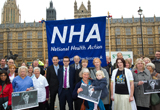 On a recent rainy Saturday in November an estimated 15,000 people marched through the centre of Lewisham in response to a call to protect their local hospital whose A&E department, children’s and maternity services are all under threat of closure. The march took an hour to file past and was remarkable for its heterogeneity, with a range of ages, social class, and ethnic mix that is rarely seen on protest marches. Many looked as though this was the first time they had taken to the streets and while the crowd was good natured and well behaved this did not disguise an underlying anger. People were angry at the politicians who had lied yet again about the NHS. They felt betrayed and without a voice when it came to one of the things that matters most to voters—the fate of the NHS, both nationally and at local level.
On a recent rainy Saturday in November an estimated 15,000 people marched through the centre of Lewisham in response to a call to protect their local hospital whose A&E department, children’s and maternity services are all under threat of closure. The march took an hour to file past and was remarkable for its heterogeneity, with a range of ages, social class, and ethnic mix that is rarely seen on protest marches. Many looked as though this was the first time they had taken to the streets and while the crowd was good natured and well behaved this did not disguise an underlying anger. People were angry at the politicians who had lied yet again about the NHS. They felt betrayed and without a voice when it came to one of the things that matters most to voters—the fate of the NHS, both nationally and at local level.
People are tired of politicians lying about their intentions for the NHS. David Cameron, the latest in a long line, promised “no more top down reorganisations” while Andrew Lansley was planning the mother and father of all top down reorganisations, so big that the NHS CEO admitted it could be “seen from space.” It happens so often, perhaps they think we’ve become inured. And somehow the NHS soldiers on, despite a reorganisation an average of every two years.
But this time the NHS is in trouble. The Health and Social Care Act, the latest redisorganisation, has coincided with an unprecedented demand for massive savings, and the strain is beginning to show. Front line job losses (7000 nurses since the election) and rationing of basic treatments like joint replacements are taking effect at the same time as the huge structural upheaval resulting from the “reforms.” The government were warned, but they insisted on pushing through the act against overwhelming medical advice and now the NHS and our patients are paying the price.
At the same time people are dismayed about the rapid introduction of the private sector, whose expertise in winning public service contracts means that small charities and social enterprises will struggle to win tenders against their teams of lawyers and their deep pockets. Surveys and campaigns show the public don’t want any further involvement of the multinationals in the NHS. They don’t like the public sector ethos being replaced by competition and companies whose first duty is to their shareholders. They don’t like watching their local hospital under threat of closure due to crippling PFI debts. Above all they find all the talk of patient choice hollow when they haven’t been offered one choice they would really like—the chance to reject these “reforms” via the ballot box.
Step up the recently formed National Health Action party, a new political party created by a group of health professionals who believe that for some time, and under the three main political parties, the NHS has been heading in the wrong direction. We, like many others, have been dismayed as we have watched the NHS being transformed from a cost effective, efficient, and popular service into a fragmented service tendered out to any willing provider.
Bevan’s three founding principles are under threat and we believe that if we don’t go out and fight for them we will lose them, along with the NHS, as a publicly delivered and publicly accountable service. Our intention is simple—to win seats in Parliament, and to challenge Labour to keep to its promises to repeal the act and reverse the changes. We won’t challenge MPs who share our aims and who are fully committed to restoring and protecting the NHS.
We also aim to keep the NHS high up on the political agenda as the next election approaches. Tony Blair apparently advised David Cameron to press ahead with the “reforms” because after the passage of the bill opposition would die away and “it would be as if it was ever thus.” We intend to keep that opposition very much alive and in the public eye.
Successive politicians have betrayed the NHS and the voters, and have repeatedly ignored the advice of healthcare professions and the wishes of the public. Mahatma Ghandi said “when the government turns against the people, rebellion is a responsibility.” The English don’t do “rebellion,” but a march of 15,000 people on a wet afternoon in Lewisham is coming dangerously close to it. What we witnessed was David Cameron’s “Big Society” on the move and the coalition and the opposition would be wise to take note.
See also:
Jacky Davis is a consultant radiologist in North London and a member of the National Health Action party interim exec. Find out more @DrJackyDavis @NHAparty
Photo credit: Mark Thomas
